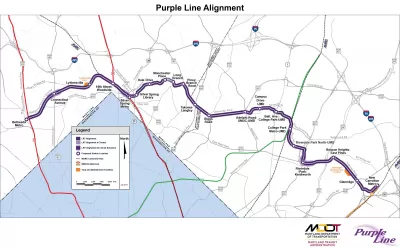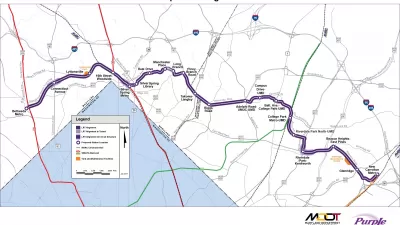The design-build team hired to build the Purple Line in Maryland could walk off the job unless a deal regarding the increasing cost of the project isn't brokered by June 20.

Back in May, the design-build consortium contracted to build the Purple Line light rail line in Maryland announced that it was planning to walk off the project in a dispute with state officials over the project's ballooning costs.
Jim Parsons reported at the time of the announcement:
Purple Line Transit Constructors (PLTP) , which includes Fluor Corp., Lane Construction Corp. and Traylor Bros. Inc, said in a May 1 statement that it has been “unable to obtain the time and cost relief to which it is entitled” from the Maryland Dept. of Transportation and the Maryland Transit Administration (MTA) to address a combination of factors that added more than a year and $500 million to the 16-mile, 21-station project across northern suburbs of Washington, D.C. that will link to existing rail lines.
In June, the threat still stands, as reported in a separate article written by Katherine Shaver on June 13. According to Shaver, industry observers are tracing the Purple Line's problems with a track record of cost overruns at Fluor Corp.
"The company’s problems include cost overruns on multiple megaprojects and a Securities and Exchange Commission investigation into whether it properly accounted for $714 million in overruns and other expenses in 2019," according to Shaver. "It’s unclear whether the SEC investigation includes the Purple Line project."
The long-disputed, long-delayed, increasingly expensive Purple Line hangs in the balance. As for what comes next, Shaver reports the following:
The three sides — the state, the construction contractor, and an umbrella group of companies overseeing a 36-year public-private partnership on the project — have until June 20 to agree on who will pay for additional costs. Unless a settlement is reached, the construction team has said it will leave in 60 to 90 days.
FULL STORY: Maryland likely to be on the hook for millions if it wants to save the Purple Line project, analysts say

Alabama: Trump Terminates Settlements for Black Communities Harmed By Raw Sewage
Trump deemed the landmark civil rights agreement “illegal DEI and environmental justice policy.”

Study: Maui’s Plan to Convert Vacation Rentals to Long-Term Housing Could Cause Nearly $1 Billion Economic Loss
The plan would reduce visitor accommodation by 25% resulting in 1,900 jobs lost.

Why Should We Subsidize Public Transportation?
Many public transit agencies face financial stress due to rising costs, declining fare revenue, and declining subsidies. Transit advocates must provide a strong business case for increasing public transit funding.

Paris Bike Boom Leads to Steep Drop in Air Pollution
The French city’s air quality has improved dramatically in the past 20 years, coinciding with a growth in cycling.

Why Housing Costs More to Build in California Than in Texas
Hard costs like labor and materials combined with ‘soft’ costs such as permitting make building in the San Francisco Bay Area almost three times as costly as in Texas cities.

San Diego County Sees a Rise in Urban Coyotes
San Diego County experiences a rise in urban coyotes, as sightings become prevalent throughout its urban neighbourhoods and surrounding areas.
Urban Design for Planners 1: Software Tools
This six-course series explores essential urban design concepts using open source software and equips planners with the tools they need to participate fully in the urban design process.
Planning for Universal Design
Learn the tools for implementing Universal Design in planning regulations.
Smith Gee Studio
Alamo Area Metropolitan Planning Organization
City of Santa Clarita
Institute for Housing and Urban Development Studies (IHS)
City of Grandview
Harvard GSD Executive Education
Toledo-Lucas County Plan Commissions
Salt Lake City
NYU Wagner Graduate School of Public Service




























